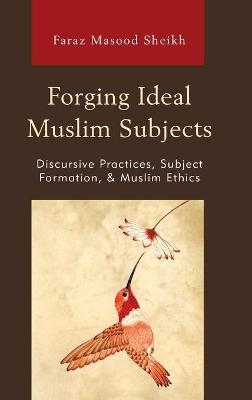
Forging Ideal Muslim Subjects
Discursive Practices, Subject Formation, & Muslim Ethics
Seiten
2020
Lexington Books (Verlag)
978-1-7936-2012-5 (ISBN)
Lexington Books (Verlag)
978-1-7936-2012-5 (ISBN)
This book describes and analyzes Muhasibi's and Nursi's accounts of what it means to live an authentically Muslim ethical life. It documents and examines the discursive practice, reflectivity, dynamism and complexity involved in living properly as a Muslim individual and social being.
There are many ways of living religiously informed ethical Muslim lives In this book, the author presents two important accounts, one by the 9th century moral pedagogue, al-Harith al-Muhasibi (d. 857) and the other by 20th century Kurdish Quran scholar, Said Nursi (d. 1960), of what the psychic states and moral subjectivity of an authentic, ideal Muslim ought to look like in everyday life. The book analyzes their accounts of the nature of and the discursive practices implicated in the self-production, of what the author calls ideal Muslim subjects. The book draws on Foucault's insights about ethics and the practices of self-care, to examine Muslim discourses in a way that enriches contemporary discussions about identity, individuality, community, authority, agency and virtue in the fields of religious ethics, Islamic studies and Islamic ethics. The author deepens our understanding of the fluidity and fragility of both the more familiar obligation-centered ethics in Islam and the less familiar, belief-centered mode of Muslim ethical life.
There are many ways of living religiously informed ethical Muslim lives In this book, the author presents two important accounts, one by the 9th century moral pedagogue, al-Harith al-Muhasibi (d. 857) and the other by 20th century Kurdish Quran scholar, Said Nursi (d. 1960), of what the psychic states and moral subjectivity of an authentic, ideal Muslim ought to look like in everyday life. The book analyzes their accounts of the nature of and the discursive practices implicated in the self-production, of what the author calls ideal Muslim subjects. The book draws on Foucault's insights about ethics and the practices of self-care, to examine Muslim discourses in a way that enriches contemporary discussions about identity, individuality, community, authority, agency and virtue in the fields of religious ethics, Islamic studies and Islamic ethics. The author deepens our understanding of the fluidity and fragility of both the more familiar obligation-centered ethics in Islam and the less familiar, belief-centered mode of Muslim ethical life.
Faraz Masood Sheikh is assistant professor of religious ethics in the Department of Religious Studies at William & Mary.
Acknowledgments
Notes on Transliteration
Introduction
Narrating Ideal Muslim Subjectivities in a Foucauldian Register
Chapter One
Muhasibian Religious Subjectivity & the Travails of Sincerity
Chapter Two
Living with Vulnerabilities: Muhasibian Moral Subjectivity and Self-Care
Chapter Three
Belief Perspectives & the Nursian Religious Subject
Chapter Four
Nursian Believer as Moral Subject
Conclusion
Forging Ideal Subjectivities Everyday & Over a Lifetime
Bibliography
Index
About the Author
| Erscheinungsdatum | 10.05.2021 |
|---|---|
| Reihe/Serie | Lexington Studies in Islamic Thought |
| Verlagsort | Lanham, MD |
| Sprache | englisch |
| Maße | 161 x 240 mm |
| Gewicht | 476 g |
| Themenwelt | Geisteswissenschaften ► Religion / Theologie ► Islam |
| ISBN-10 | 1-7936-2012-1 / 1793620121 |
| ISBN-13 | 978-1-7936-2012-5 / 9781793620125 |
| Zustand | Neuware |
| Haben Sie eine Frage zum Produkt? |
Mehr entdecken
aus dem Bereich
aus dem Bereich


